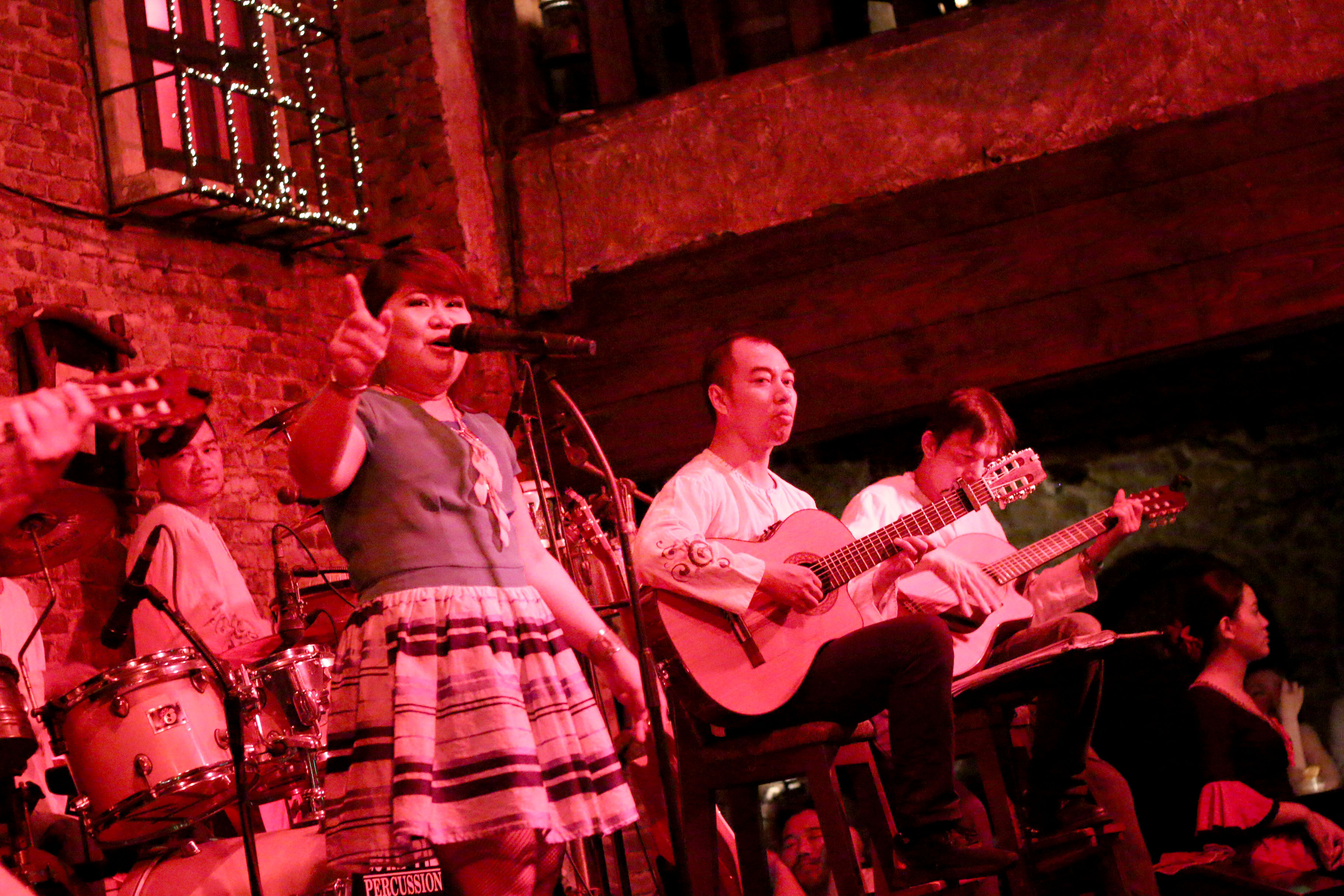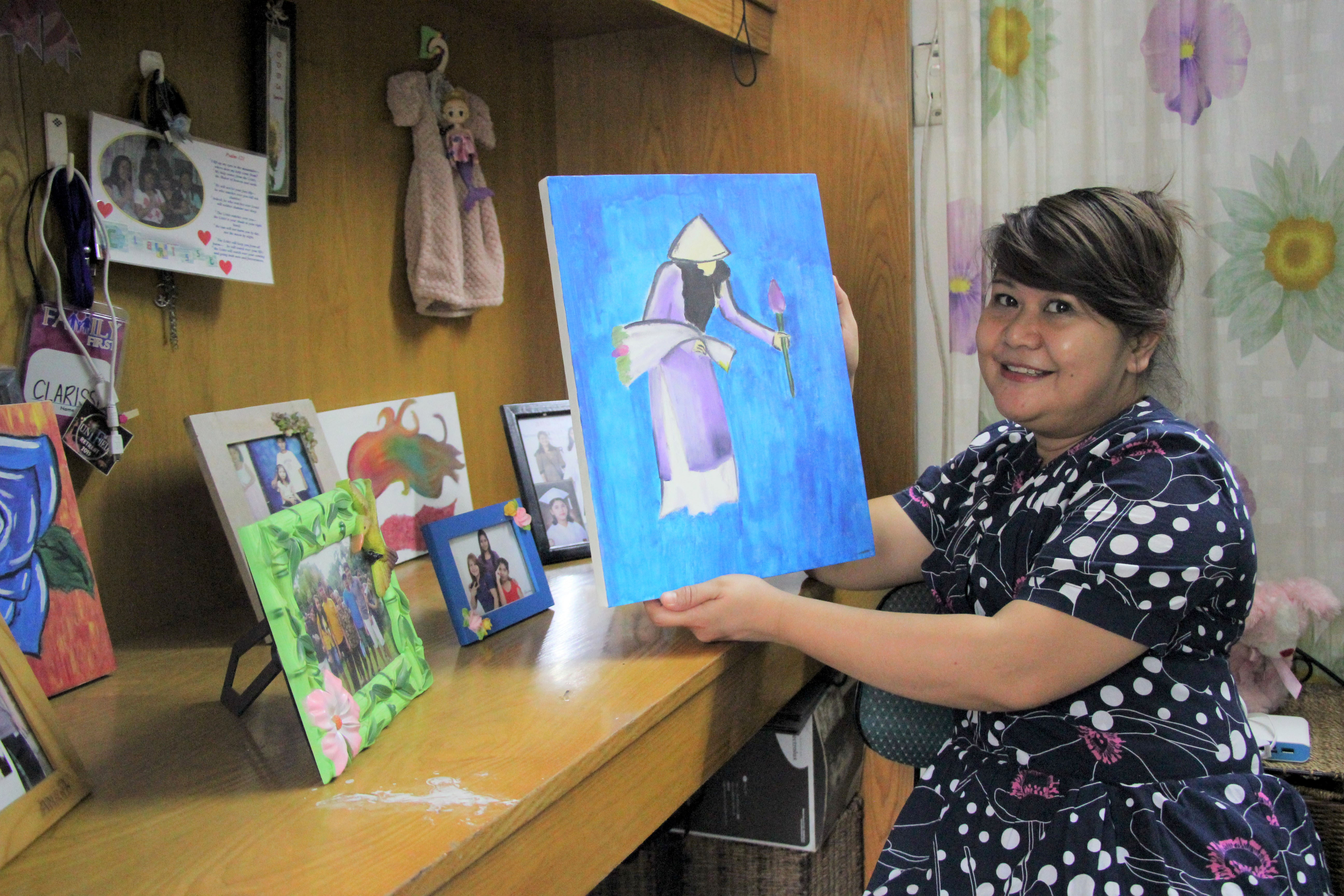“If I stop singing in Vietnam, I won’t sing any place else,” Filipino singer Clarisse Cantos told Tuoi Tre News after a gig in District 1, Ho Chi Minh City.
>> Filipino singers in Vietnam – P1: The beauties on stage
Half a life in Vietnam
On a small stage at Carmen, a cozy live music lounge in District 1, 47-year-old singer Clarisse Cantos keeps the crowd moving and shaking with her catchy renditions of Vaya Con Dios’s “Neh Nah Nah Nah” and “Mas Que Nada” from the animated movie “Rio.”
Though her set at Carmen lasts a quick 30 minutes, over the past 10 years many of the bar’s regulars have become faithful fans.
 |
| Filipino Clarisse Cantos at Carmen bar. Photo: Tuoi Tre |
Hoang Viet, the manager at Carmen, confirmed that many of the bar’s customers are self-proclaimed fans of Cantos.
“I have stayed here half of my life. When I first came to Vietnam, I was just turning 20,” Cantos said.
Many of her colleagues credit Cantos as being the first Filipino singer to take up work in Vietnam, paving the way over the past 25 years for others from her country to bring their talent to bustling hubs like Hanoi and Ho Chi Minh.
Cantos’s story began in late 1994, when her band was invited to Hanoi to perform at the Royal Palace.
Knowing nothing about Vietnam, Cantos only considered the country a brief stop on her music journey. In the end, her band members moved on but she chose to stay.
In 1995, Cantos and her band were featured in a documentary by a UK news agency as the first Filipino band in Vietnam after the war.
After a year in Hanoi, Cantos moved to the central city of Da Nang and eventually Ho Chi Minh City.
Though the ups and downs of life have sent her back to the Philippines and even Australia to earn a living, Cantos plans to keep Vietnam as her home base.
A singer by chance
As a young girl, Cantos studied psychology until dropping out of school during her third year of college when a band “discovered” her and her voice.
“I never sang in the Philippines. The only singing I had ever done was karaoke. Then, I became a singer until now,” she recalled.
The band invited Cantos to Malaysia to perform.
At first, she accepted the offer – after all, her three siblings were in school and the work would give her the opportunity to take the financial load off her parents’ shoulders.
In explaining the reason of traveling abroad to work, Cantos said singers in the Philippines at that time were paid only US$10-20 for a four-hour gig.
Places like Vietnam offered significantly more.
“Around ten years ago, there weren’t many Vietnamese singers singing English so that created opportunities for us to work here,” she explained.
Though singing salaries in the Philippines are getting higher, Cantos feels she is no longer suited to perform there, as people in the Philippines no longer prefer the older songs she enjoys singing most.
Meanwhile, in Vietnam, both in the 90’s and today, Vietnamese music lovers still favor bands like the Carpenters, The Beatles, Boney M., and Air Supply – the kind of music Cantos feels she sings best.
“Vietnamese singers are getting better and better at singing English, but there are still not many people who sing Spanish so I think I still have opportunities here,” Cantos, a wonderful Spanish singer, declared.
“But if I stop singing in Vietnam, I think I will quit singing because I’m already old,” she laughed.
 |
| Filipino Clarisse Cantos at a bar in District 1, Ho Chi Minh City on March 30, 2018. Photo: Tuoi Tre |
Her second home
Spending half of her life in Vietnam, Cantos does not hesitate to call Vietnam her second home.
She even admitted to feeling like a stranger when she visits the Philippines.
Cantos even named her daughter Anh Moreen – the first part, “Anh," from a Vietnamese word.
“When people ask my daughter why her name has a Vietnamese word, she always proudly says that she was ‘created’ in Vietnam,” Cantos shared with a smile.
“I like living in Vietnam because I have a simple and quiet life here,” she said.
“I went to Australia but it’s too far away from home. Staying in Vietnam, I can easily come back to see my children or bring them here for a visit,” she added.
After divorcing her Filipino husband, Cantos became a single mother and devotes her life to her children.
They are also the motivation for the singer to be on stage.
In her rented room on Dien Bien Phu Street in District 3, where she has stayed for the past 10 years, Cantos still keeps many of her children’s things from the time they lived with her before returning to the Philippines for college.
 |
| Clarisse Cantos shows a painting made by her daughter displayed in her rented room in District 3, Ho Chi Minh City. Photo: Tuoi Tre |
|
In explaining why Filipino singers are favored in Vietnam, Doan Van Tuan, manager of the rooftop bar at Majestic Saigon Hotel, said besides the ability of singing English, Filipino singers do know how to please their audiences. They can meet nearly 90 percent of the requests from customers and are very up-to-date with the world’s popular songs. “Vietnamese singers are not really good at singing English so audiences still prefer Filipino singers. We have many guests who come only for foreign singers,” Tuan revealed. Meanwhile, Nguyen Si, owner of La Piscine Lounge, said lounges which play foreign music in Ho Chi Minh City often hire Filipino singers for their English command as well as their passion and dedication to their performances. They are willing to sing as much as the audiences request, even if their working time is over, he added. According to Pham Cong Khoan, a representative of an event planning company in Ho Chi Minh City, although Filipino singers are more “expensive” than Vietnamese singers, many event organizers still pay to invite them because of their love of performing, even if they have to wait a while for their turn. |
Like us on Facebook or follow us on Twitter to get the latest news about Vietnam!



















































